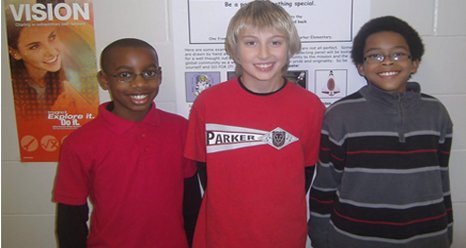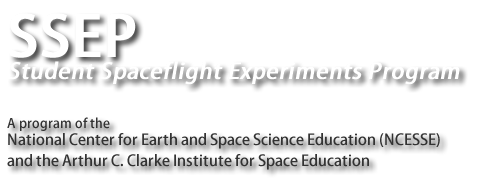
(Left to right) Michael Prince, Maxx Denning and Aaron Stuart coauthored the proposal titled “Will Vitamin C Help Preserve Bone Density in Microgravity?” as part of the Student Spaceflight Experiments Program efforts of Parker Elementary School in Houston, Texas.
Yesterday we received a special thank you from the parents of Michael Prince, a Co-Principal Investigator on a Mission 1 flight experiment to the International Space Station. Michael is a 5th grader at Parker Elementary School in Houston. Michael’s dad points to “great teachers, schools and programs like this”. We may have supplied the program but it was Johnston Middle and Parker Elementary in Houston ISD that provided the great teachers and schools. To spread the thanks, we asked if we could post the note, and Michael’s dad graciously said yes. Below is the thank you. If it moves you, feel free to leave a comment below:)
“I am the father of Michael and would like to thank you for your program. Our son has really been excited and we are eternally grateful. As parents our job is to give direction and the necessary support to our children. With great teachers, schools, and programs like this, it makes our work a “joyride”. We can see a noticeable change in our son and his “vision” has now been expanded beyond just the “here and now”. Our family and friends are proud but also humbled by this achievement which is truly a blessing.We look forward to the continued progress and success of the project and the program, praying that both will help bring advancement for our world in the area of science. Again, we thank you.”
Mr. Michael Prince
and Karan Prince
Here is a descripion of the flight experiment from Co-PIs Denning, Prince, and Stuart, staff of the Parker Elementary School Space Program—
Will Vitamin C Preserve Bone Density in Microgravity?
Grade 5; Parker Elementary School
Co-Principal Investigators: Maxx Denning, Michael Prince, and Aaron Stuart
Teacher Facilitator: Rebecca Mitchell, 5th Grade Teacher
Proposal Summary:
Our experiment will test to see if liquid Vitamin C will preserve bone density in microgravity in a chicken bone. Our team is conducting this experiment to prove whether or not vitamin C can preserve bone density. First, we will split a wish bone in half. Next, we will place one half in each FME. Finally, one wish bone half will be flown in a chamber into space. The other bone sample will be remain in the same type chamber on earth. When the one from space returns, we will measure the affects of microgravity on the bone and compare it to the sample on earth in an effort to see if liquid Vitamin C did preserve bone density.
If liquid Vitamin C helps preserve bone density, then this will be helpful to astronauts who stay in space over a long period of time. Astronauts can take vitamin C in addition to exercising to help keep their bones strong. This issue is more important than ever because we know that WHEN we go to Mars, it will take about 21 months (round trip). If we cannot find a way to preserve bone density, the astronauts will lose over one half of their bone density on a long term mission. On earth, this knowledge will help people by encouraging them to take Vitamin C to keep their bones strong.

Comments are closed.